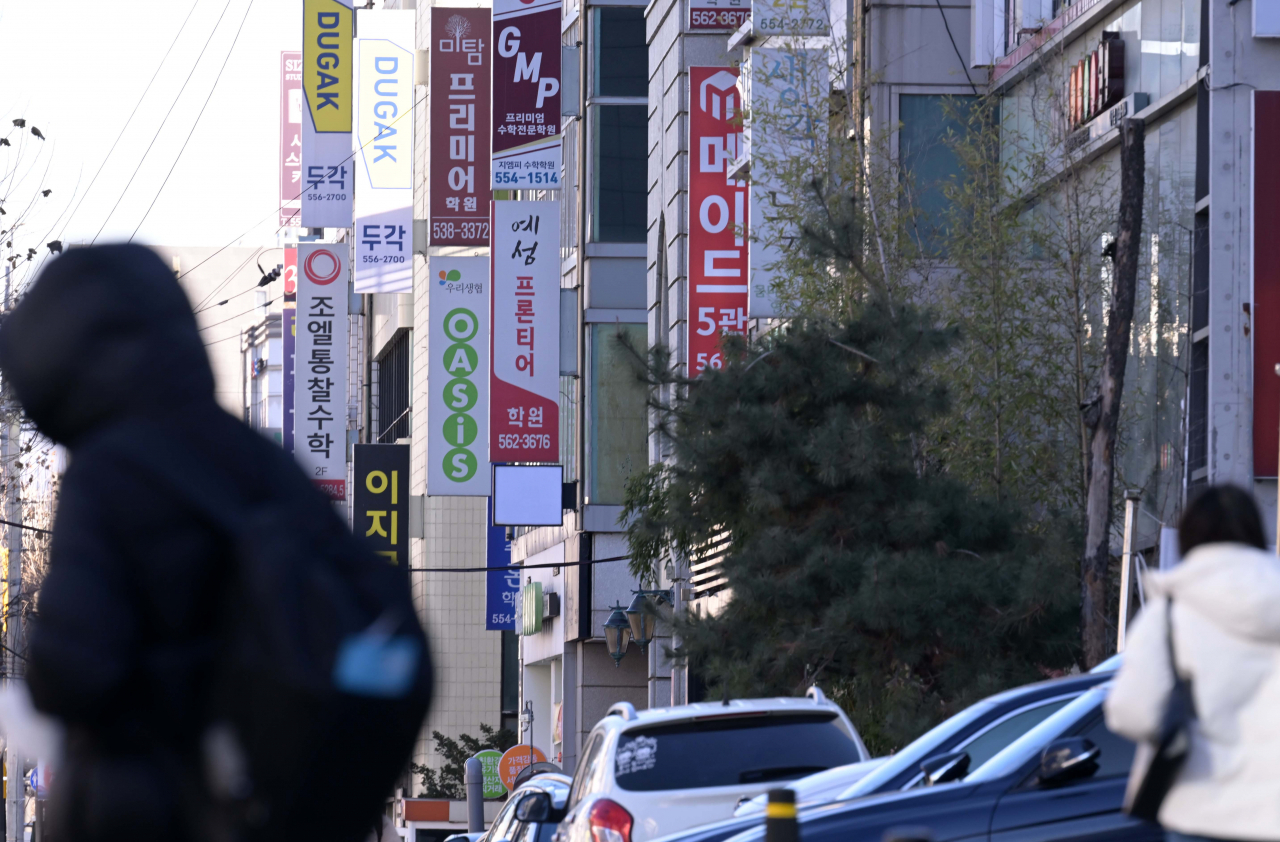[Korean Dilemma] Rigid thinking fuels never-ending test attempts
More and more young Koreans stuck on college admission exam for years, never mind mental health
By Kim So-hyunPublished : Jan. 31, 2023 - 17:06

Sixteen-year-old Koh Yoo-jin spends her winter break at a math hagwon from 9 a.m. through 5 p.m. In the evening, she does her homework and studies other subjects until 1 a.m.
Like her peers, she finished learning everything on the high school math curriculum before graduating from middle school, and has since been working on endless drills to prepare herself against “killer questions” in "Suneung," or the College Scholastic Ability Test.
Studying for the multiple-choice Suneung, which takes up much weight in college admissions, means going over every possible type of questions including questions from past tests.
Koh is one of the tens of thousands of teenagers whose lives have revolved around South Korea’s notorious cluster of cram schools in Seoul’s Daechi-dong, Gangnam-gu, since elementary school.
Some hagwon, as these private institutes are called, advertise that they run “padlock classes,” where they lock up kids during class hours, apparently a popular choice for parents who want to make sure their children study.
“Thinking Bull,” a nationwide chain of math hagwon that started in Daechi-dong, rose to its fame for not letting elementary schoolchildren leave until they finish solving a set of problems by themselves.
The obsession with college admission often doesn’t end in high school.
In Gangnam-gu and Seocho-gu, more than half of the Suneung examinees each year are retakers called "jaesoosaeng" (second-timers), "samsoosaeng" (third-timers) or "N-soosaeng" (those taking the test for the Nth time).
Many of them attend university for a semester -- because schools don’t allow taking leave in the first semester -- and take the second semester off to study and sit for the CSAT in November.
As more and more kids choose to "jaesoo" or retake, some college departments lose up to a half of their freshmen before fall, a major setback for the departments whose yearly budget is allocated based on the number of students enrolled.
According to a staff at Jongno Hagwon in Seoul's Sinchon, even those in their second or third years in college come to the hagwon to give the dreaded exam another try.
Some say they wouldn't mind taking Suneung seven times if it means they can go to a medical college, the utmost goal the nation's brightest have raced towards since kindergarten.
Koreans generally agree that the growing percentage of jaesoosaeng and the obsession with medical college are unsettling, but many also say, on a personal level, it’s understandable since this is a country where countless people already spend their 20s and 30s studying for exams to work in the government, state-funded companies, big-name firms or as licensed professionals.
Even President Yoon Suk Yeol passed the bar exam after eight unsuccessful tries.
One might interpret this as Koreans’ unwavering determination and perseverance to achieve their dreams, but it often has more to do with Koreans having very fixed mindsets about society and professions.
According to Statistics Korea in May last year, of the 4.2 million economically inactive population aged between 18 and 29, over 40 percent were prepping for exams to become civil servants (30 percent) or licensed professionals (11.6 percent); 16 percent to be teachers, journalists or to work at state-funded companies; 24 percent to work at other firms; and 19 percent for technical licenses.
Of the 24 percent eyeing regular firms, most are looking at the nation’s largest conglomerates like Samsung and Hyundai-Kia.
As a result, small- and medium-sized firms, which account for about 90 percent of the nation’s workers, are always short on staff, polls have shown.
This is partly due to the wide pay gap between SMEs and large companies, so solid mid-sized firms in need of high-grade manpower should try harder to attract more staff.
The biggest problem is that the perpetual stress from the rat race often eats away at many young people’s minds, contributing towards the increase of children and adults suffering from various mental disorders.
Well aware of the limitations of rote memorization-based learning and testing in today’s AI-powered world, the government, for its part, is eyeing the International Baccalaureate program as a possible alternative.
But what’s more important is that, instead of just following what others are doing, as parents we should try to better observe and understand our kids. We must grant them the same compassion we give our friends. Use your critical thinking skills to filter key information about the fast-changing world, and remember that the mental and physical health of a child should come above everything else.
The Korean dilemma, a column series by Korea Herald reporter Kim So-hyun, delves into ironies and contradictions of Korean life and the Korean psyche behind it. -- Ed.







![[Graphic News] More Koreans say they plan long-distance trips this year](http://res.heraldm.com/phpwas/restmb_idxmake.php?idx=644&simg=/content/image/2024/04/17/20240417050828_0.gif&u=)
![[KH Explains] Hyundai's full hybrid edge to pay off amid slow transition to pure EVs](http://res.heraldm.com/phpwas/restmb_idxmake.php?idx=644&simg=/content/image/2024/04/18/20240418050645_0.jpg&u=20240419100350)








![[KH Explains] Hyundai's full hybrid edge to pay off amid slow transition to pure EVs](http://res.heraldm.com/phpwas/restmb_idxmake.php?idx=652&simg=/content/image/2024/04/18/20240418050645_0.jpg&u=20240419100350)

![[Today’s K-pop] Illit drops debut single remix](http://res.heraldm.com/phpwas/restmb_idxmake.php?idx=642&simg=/content/image/2024/04/19/20240419050612_0.jpg&u=)